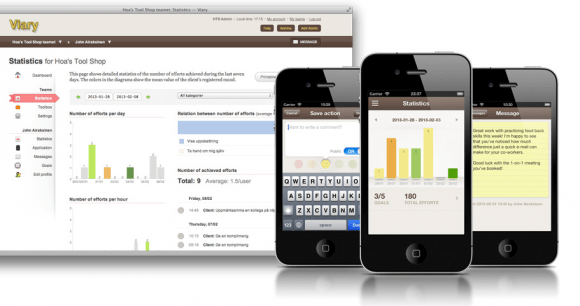
Since meeting Hoa’s Tool Shop at the Stockholm Startup Day, I’ve been really interested in everything they’re doing. They’re a team of three psychologists and one developer who are cranking out applications and… tools to effect behavior change – which is a term they use a lot. Given their background they look a the world differently than most startup founders, and benchmark themselves differently from trying to “gamify” or “influence”, but instead look at the word more clinically.
The main product they’re developing is Viary, a tool for clinical psychologists and organizational consultants to drive behavioral change, and reduce the amount of face-to-face time needed to meet for therapy.
The mobile app works by having psychologists individually fill each of their cleint’s app with tasks (or as they call it, behaviors to accomplish) related to their case, which could range from getting up when the alarm rings in the morning, or to call a family member. Afterwards, the app asks them to judge how the behaviors helped with their depression, and allows the psychologists to follow up with their comments. It sounds simple, but it’s the type of actionable behavior that drives change, and being sure clients follow up on their actions helps guarantee results.
“People are actually doing what is said in the session. We think that’s development.” says Hoa Ly, CEO of Hoa’s Tool Shop.
They’ve also turned their app in to a research study. Using 88 participants qualified as severe depression, one group was given ten face-to-face sessions using CBT, or Cognitive Behavior Therapy. The other group was given four face-to-face sessions as well as the Viary app to work with. The results show that the groups were equally effective in reducing their depression from severe to mild depression – the lowest depression grade.
In all, their study will show that they could cut down on six sessions by employing their technology. The impact of this is potentially huge, given the amount of man-hours needed to effectively treat each case. Additionally, the app can be used for more than just depression, whether it be creativity, working better in relationships, or anxiety.
In the future Ly pictures the app becoming automated after tracking what behaviors are impacting the most change. We likely won’t see that update coming in the near future, as Ly says it’s a huge mission and will have to do it really well to succeed. But in the meantime they’re doing well selling this solution as a subscription model to clinical psychologists and organizational consultants.




